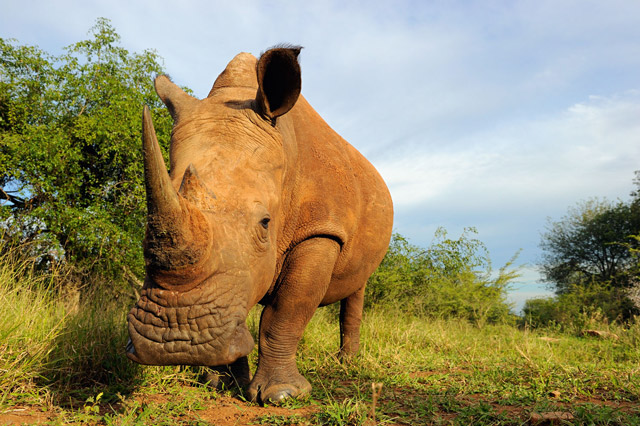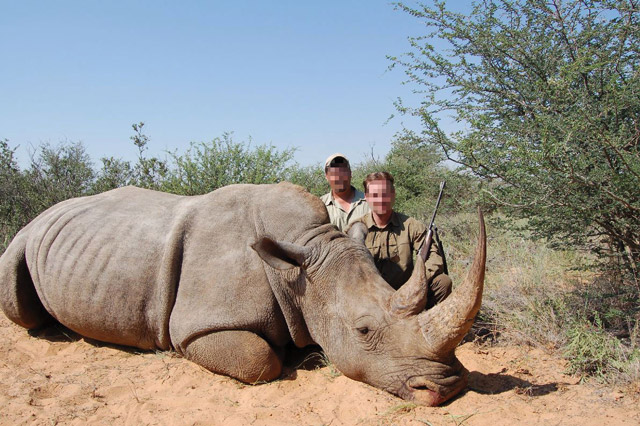 Tim Jackson
Tim JacksonOver the past couple of weeks the 57-year-old Timbavati Private Nature Reserve has fuelled the always volatile ‘hunting debate’ by deciding to conduct rhino hunts on its property. Africa Geographic founder Peter Borchert throws out a challenge.
Timbavati is part of the Associated Private Nature Reserves (APNR) that include concessions offering clients both wildlife viewing/photographic safaris and hunting safaris. The fences that once separated the properties on the APNR reserves and from the western boundary of the Kruger National Park have been long gone, allowing game including lions, cheetahs, rhinos and elephants to move without hinder through the greater region. I guess this raises the question of who actually owns the game, but that is another question.
Quickly, as things do, the Timbavati situation has once again brought the highly polarised rights and wrongs of trophy hunting to the fore. And, as such things also tend to foster, there is a great deal of self-righteous huffing and puffing from both sides.
The ‘pro’ faction claims the voice of reason, the high ground of ‘economic sustainability’, the ‘scientific proof’ that the selective hunting of a few carefully targeted individuals presents no threat to the species, the return on investment of hunting safaris versus photographic safaris, and the ‘inescapable fact’ that it is only through trade and the commoditisation of wildlife that conservation can be suitably funded and vulnerable species properly protected.
Aside from the ‘moral reprehensibility’ of trophy hunting, many in the ‘anti’ camp would argue with reasonable justification that the hunting fraternity and conservation officialdom in South Africa is rife with corruption and alive with opportunities for laundering trophies into the global illegal trade for products such and horn and ivory. There are more than enough specifics to bear this out and to support a contention that within an industry so infected with nefarious practice, the hunting of species such as rhino is just not on.
And so views, and often insults as well, are traded back and forth, sometimes with some good thoughts around compromise, but not very often.
Where do I stand? Well I do not like trophy hunting. In fact I believe that it is a wholly inappropriate activity for our time. And I just don’t get the psyche of people who regard it as ‘sport’ to kill a beautiful wild animal in order to display its horns, tusks or other attributes of size or rarity on a wall. But with that out of the way, I do recognise that hunting is big business with a very powerful lobby and that, in some extensive areas where land may be marginal in respect of operating photographic safaris, hunting – even trophy hunting – may well be the only reasonable revenue-earning opportunity for the landowner.

The chairperson of Timbavati, Tom Hancock, has set out in an open letter the view of the game reserve’s board and its justification for allowing hunting. I suggest that you read it.
Timbavati is a designated buffer zone of the Kruger National Park and as such trophy hunting is one of the activities permitted. But is legal entitlement always morally right? Instead of going down that rabbit hole I would like to offer a simple challenge based on economics and the management of business risk.
Some of South Africa’s best known safari lodges lie within Timbavati , all of which with great justification claim unbeatable close-up wildlife experiences in an area that opens uninterrupted into the vastness of the Kruger Park. How would the thousands of people who come from all over the world for these experiences react to the knowledge that hunting is also permitted in their piece of paradise?
Are these top lodges, indeed the whole APNR, up to the transparency of stating upfront and clearly on their websites, brochures and other marketing material, as well as explaining to guests, that they are part of an organisation that supports trophy hunting? Are they prepared for any backlash that might ensue? Are they sanguine about possibly compromising the millions of dollars of photographic-safari revenue derived from their very fine lodges for the several hundred thousands of revenue from a couple of trophy hunts?
And how would the million or so annual visitors to the Kruger Park react if they knew that the rhinos and other animals they have seen could theoretically move a few kilometres and end up in the sights of a hunter. After all the APNR and Kruger are all elements of the same uninterrupted ecosystem. Same rhinos, same ellies, same everything…
http://blog.africageographic.com/africa ... challenge/


